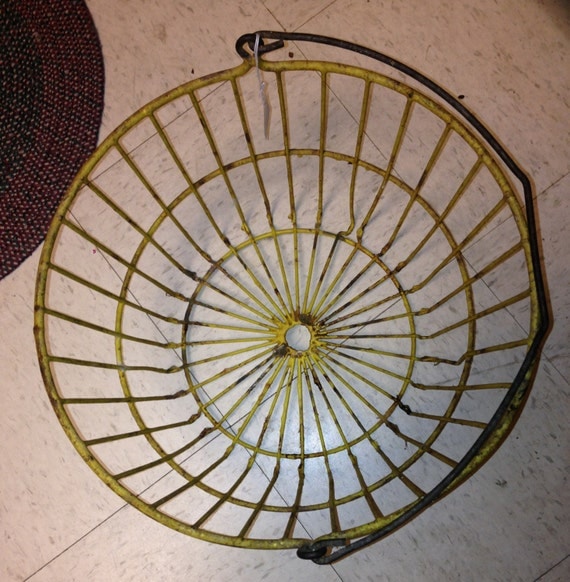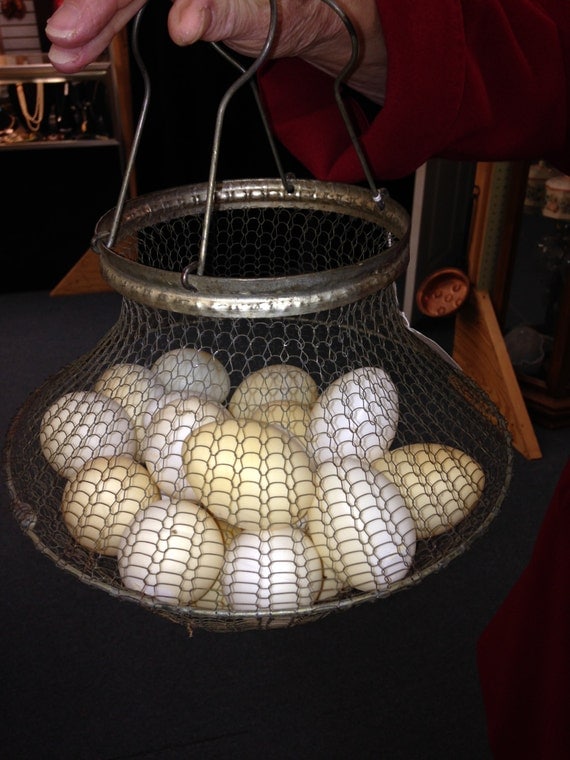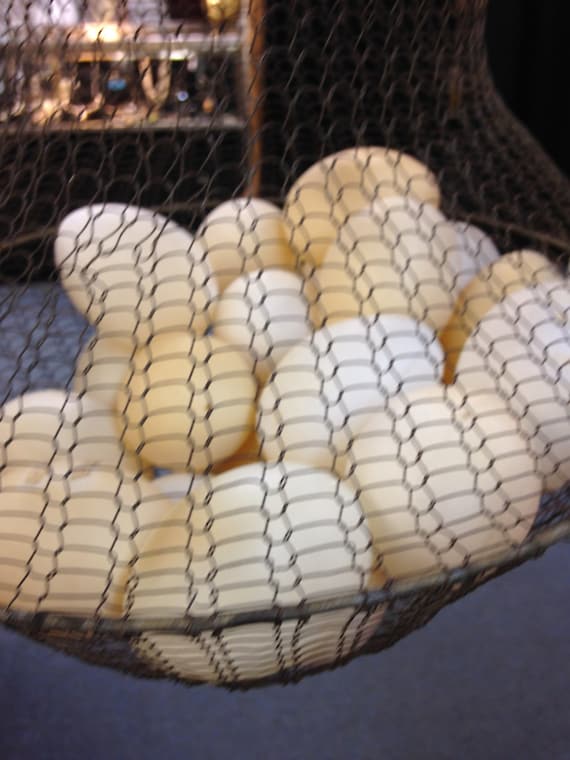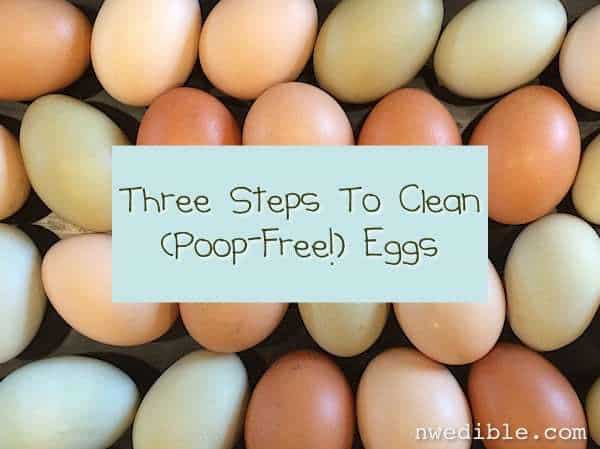Three Steps To Clean, Poop-Free Eggs
If
you are a chicken-keeping gardener like me, you know that the
second-best thing hens give you is eggs. The first best thing they give
you is their awesome nutrient rich poop!
As grateful as I am for both the poop and the eggs, I prefer them to
be gifted separately. Typically if the eggs I’m collecting are
poop-smeared it’s a sign that the chicken-keeper (
ahem – me) needs to step-up her daily coop maintenance.
1. Keep Paths to Nesting Boxes Clean
Although a hen’s poop and egg exit through the same hole – called the
vent – they come from different internal channels. The poop comes down
the intestine and the egg comes down the oviduct. The egg, as it exits,
pinches off the intestine so it’s not possible for a hen to lay an egg
and poop at the same time, or for poop to get on an egg inside a hen.
(For an awesome explanation of all this complete with MacPaint-style
illustrations, see
How a Hen Lays Her Egg.)
Occasionally some hygiene deficient hen will lay an egg while her
bum-feathers are full of poo and end up soiling everything in the nest
box, but more often poop that ends up on eggs has been
tracked into the nesting box.
A chicken feels the egg-laying urge and makes her way to the nesting
boxes. On the way she steps through the giant pile of chicken poop under
the roosting bars. Now she’s got a bunch of poop on her feet, and after
she walks or flies into the nesting area, she steps on the half-dozen
eggs already in the nesting boxes, tracking poop all over each of them.
Poop-free eggs are therefore typically the benefit you get for keeping the
pathways to the nesting-boxes clear.
I have sand in the upper portion of my coop, which is where the
nesting boxes and the interior roosting bars are. I really love the sand
bed for how easy it makes poop maintenance.
First, the sand acts like kitty-litter, drying out and clumping
around the chicken poop. Removing the poop is a simple matter of raking
it down into the straw-based, composting deep-litter system in the
enclosed run below. Second, the grit of the sand acts a bit like a
welcome mat, and as chickens walk over it towards the nesting boxes, it
helps to scrape debris off their feet.
If I rake the poop of the sand-bed daily, I almost never have dirty
eggs. I once timed how long it took to rake the entire sand-bed area
clean and it was 45 seconds, so I have no real excuse to
not
take care of it. Every coop is different, but whatever steps you can
take to make sure the chicken’s natural pathway to the nesting box is
poop-free will help ensure clean eggs.
One sure-fire way to get really poopy eggs is if your hens sleep in
the nesting boxes or just above them. Do whatever you must to discourage
this behavior. Make sure your nesting box has a steep roof to stop
night-time roosting, and if necessary, block off the nesting boxes from
dusk till dawn, until hens (typically young pullets) learn to sleep
elsewhere.
2. Keep Nesting Box Material Clean
If poop or (worse, in my opinion) a broken egg soils your nesting
box, deal with it right away. Lingering poop is just nasty, and tends to
re-soil eggs over and over as hens step in it and spread it around.
Thick layers of clean nesting box liner material is key.
My recent order of fruit trees came packed with bags and bags of shredded newsprint and scrap paper.
Rather than recycle the paper, I collected it up and hung it from a
couple of bags in the coop. Now there is a ready, easy-to-grab source of
“top up” material for the nesting boxes.
I have also used straw, burlap, shredded junk mail (plain paper only)
and wood shavings for the boxes. As long as the material is soft,
shapeable and offers great padding to the eggs, you can use whatever is
cheap and available. I strongly prefer biodegradable nest box material,
so I can just toss spoilt material into the deep liter portion of the
coop and let it compost. When the nesting box material starts to get
that not-so-fresh quality, swap it out or top it up as appropriate. If
an egg breaks in there, replace all the nesting box liner material.
3. Collect Eggs Frequently
The more frequently you can collect your eggs, the less chance that
one poopy butt or foot is going to dirty a whole clutch of eggs.
I try to collect eggs twice a day – my daughter collects in the
morning when she feeds and waters the hens, and I collect later in the
afternoon when I need a break from being inside and go out to see how
the farmlette is doing.
If any stragglers lay late in the afternoon, we will bring those eggs in at night when we lock the hens in for the night.
To Wash or Not To Wash
Sometimes, no matter how scrupulous your maintenance or diligent your
egg collection, you will still collect a poopy egg or six. I’ve read
some advice to discard any egg that has poop or dirt on it and, frankly,
I think that’s silly. I’m not going to throw away a perfectly good egg
that one of my chickens worked hard to make and push through her oviduct
just because it’s a little dirty on the outside.
I prefer not to wash my eggs unless they are noticeably dirty because
when a hen lays an egg, she coats it with a natural “bloom” to seal the
shell from dirt and bacteria. When we wash off this bloom, we reduce
the storage life of the egg (store washed eggs only in the
refrigerator!) and actually make it
more likely that the edible portion of the egg will be compromised with bacteria
.
That said, sometimes the “Eww, I can’t store that,” factor wins out. When that’s the case,
Step One
(for lightly soiled eggs) is to gently buff or scrape off any dried
poop with a dry nylon scouring pad or a clean dry dish towel.
Step Two (for more highly soiled eggs) is to actually wash the egg.
Again, I consider this something of a last resort. Interestingly, the
rules regarding commercial egg production in the United States
require washing and sanitizing. In Europe, it’s the opposite: washing is forbidden. According to
Forbes,
United States Department of Agriculture (USDA) graded
eggs would be illegal if sold in the UK, or indeed anywhere in the
European Union (EU). It’s all to do with the fact that commercial
American eggs are federally required to be washed and sanitized before
they reach the consumer. EU egg marketing laws, on the other hand, state
that Class A eggs – those found on supermarkets shelves, must not be
washed, or cleaned in any way.
“In Europe, the understanding is that this mandate actually
encourages good husbandry on farms. It’s in the farmers’ best interests
then to produce to cleanest eggs possible, as no one is going to buy
their eggs if they’re dirty, ” explained Mark Williams, Chief Executive,
British Egg Industry Council in a phone interview.
When I need to wash my backyard eggs, I hold a soiled egg under hot
running water – about as hot as I can comfortably stand but not so hot
as to start to cook the egg – and rub off any offensive dirty spots with
my fingers or a soft clean dish towel.
The use of water hotter than the egg is important so that external
bacteria doesn’t get sucked through the pores of the egg and end up
contaminating the inside of the egg. For more about that, see this
PDF from the University of Nebraska.
Although commercial eggs in the US are sanitized with a dilute bleach
solution, I opt not to dip my eggs in a bleach bucket. I like to live on
the wild side like that.
See original post; http://www.nwedible.com/2014/04/clean-poop-free-eggs.html
..











